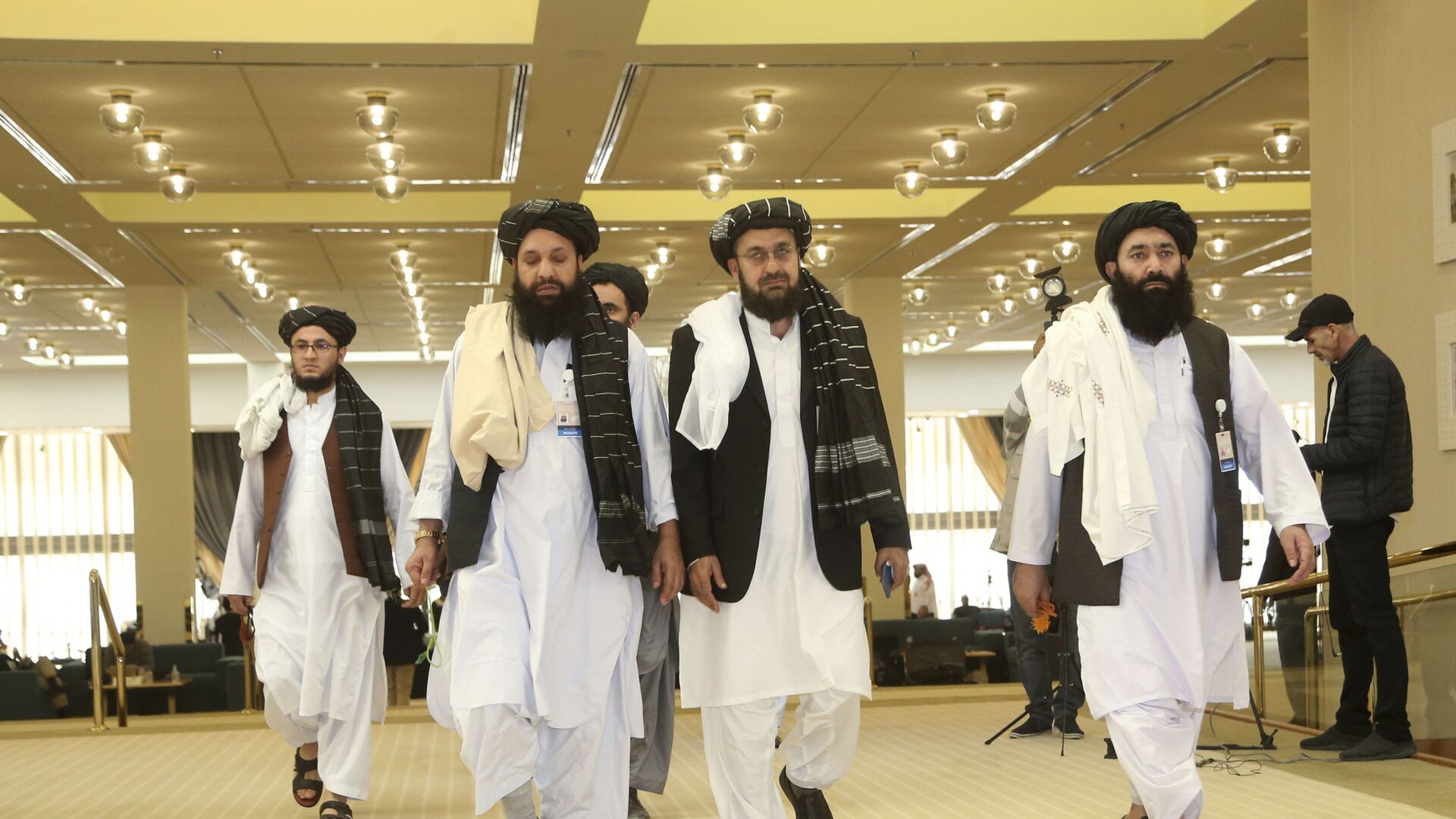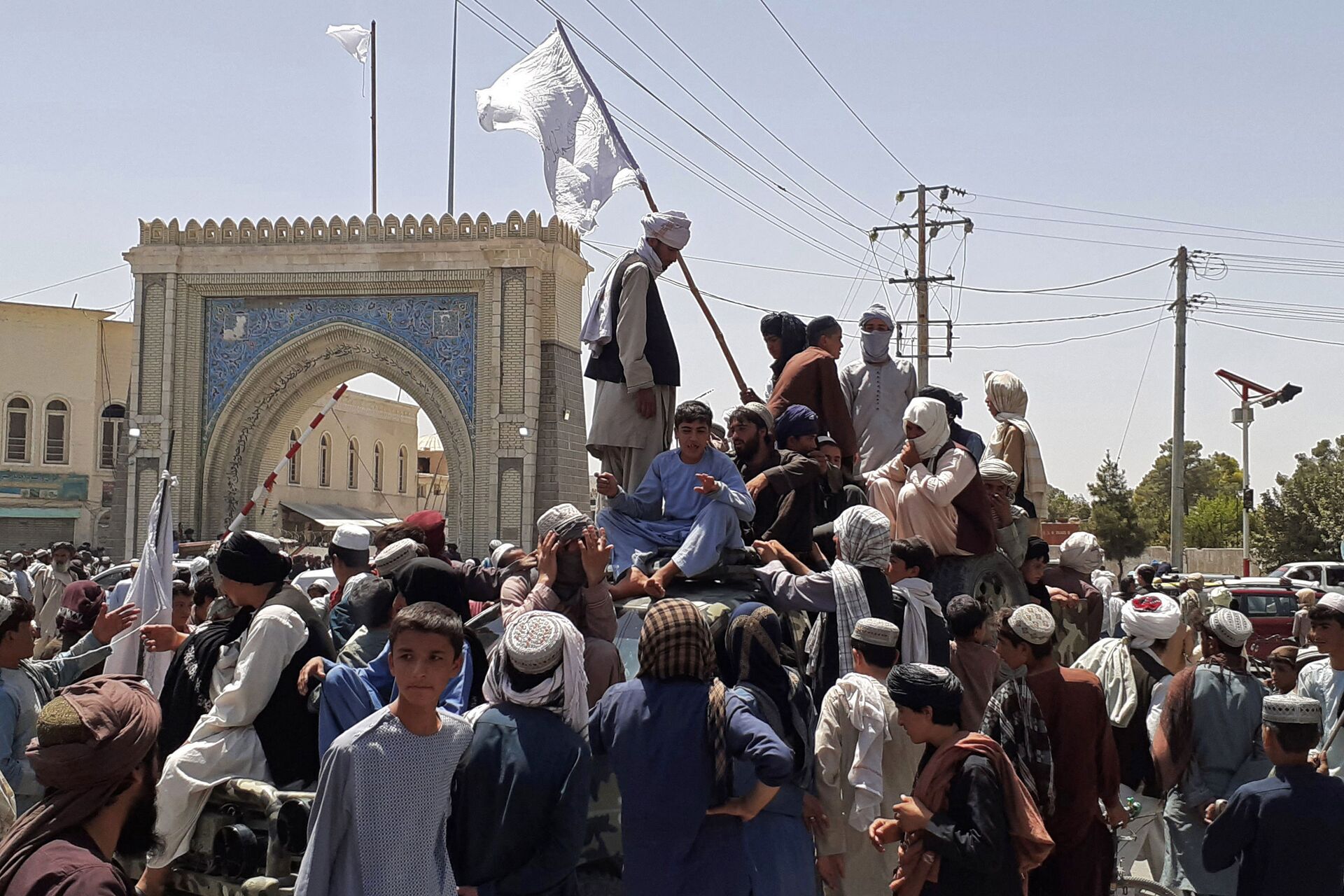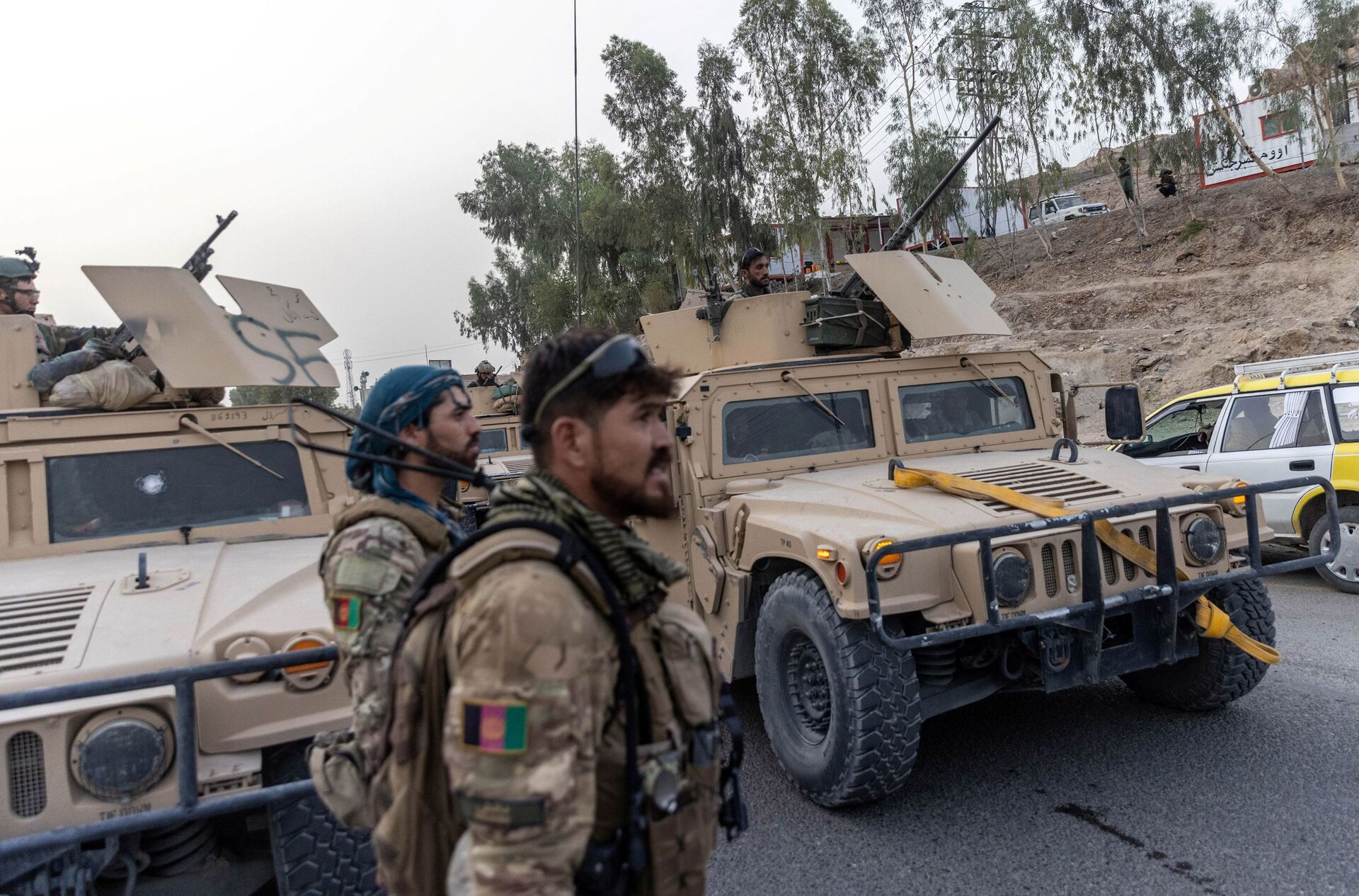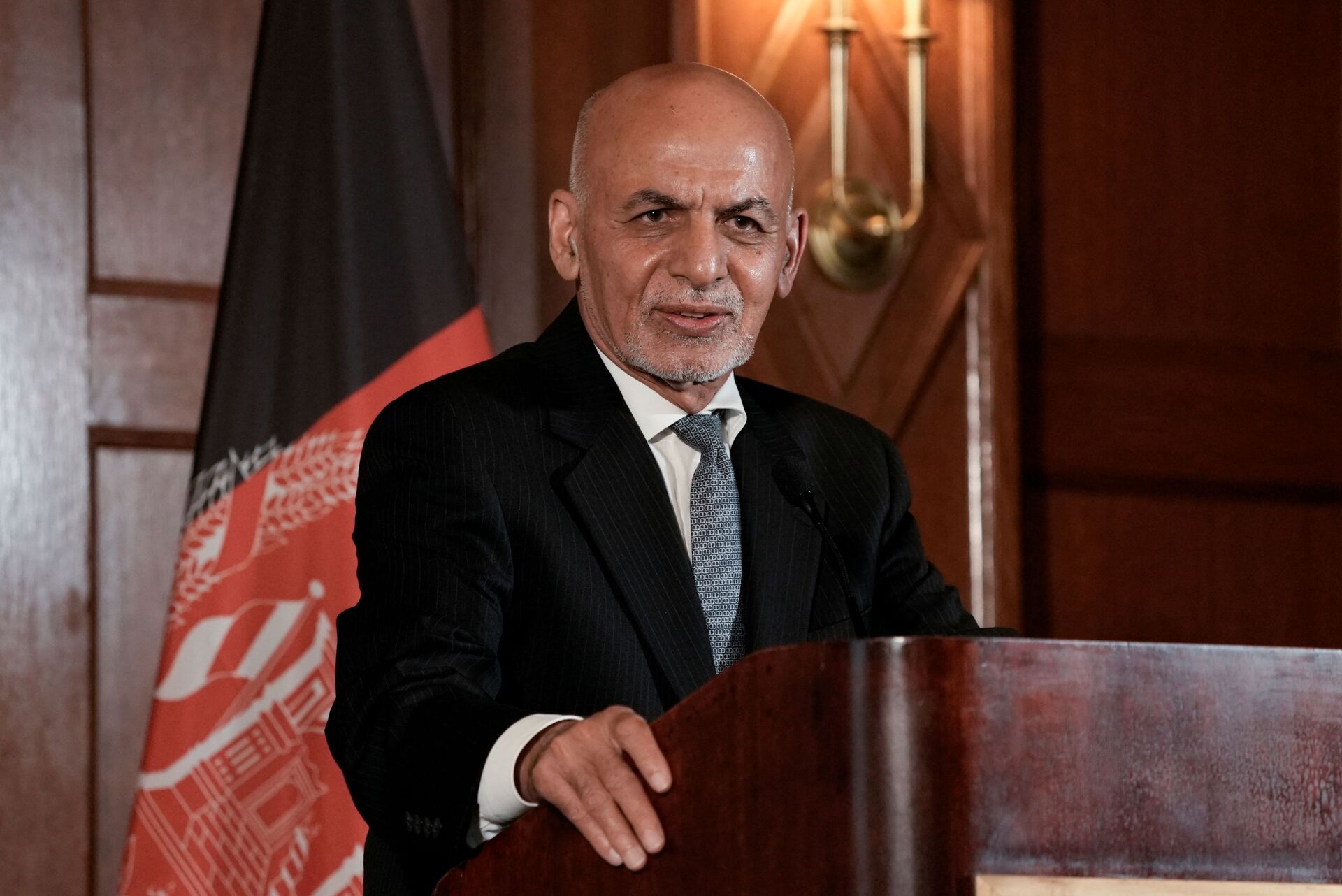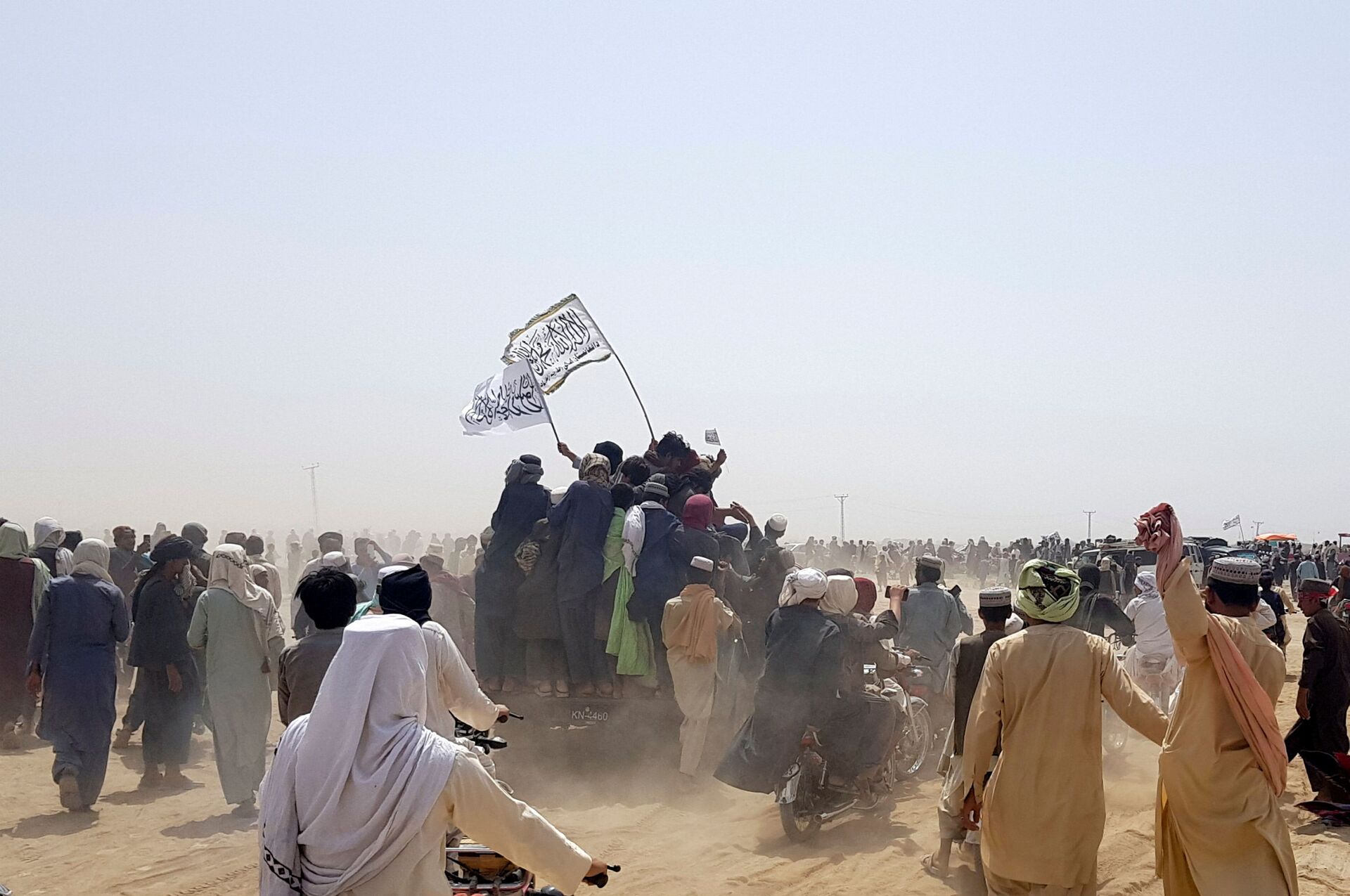https://sputnikglobe.com/20210814/talibans-advance-leaves-kabul-with-little-choice-as-us-trained-afghan-forces-retreat-scholars-say-1083600050.html
Taliban's Advance Leaves Kabul With Little Choice as US-Trained Afghan Forces Retreat, Scholars Say
Taliban's Advance Leaves Kabul With Little Choice as US-Trained Afghan Forces Retreat, Scholars Say
Sputnik International
The Taliban* seized four more provincial capitals on 12-13 August, including Herat in the west and Kandahar in the south, amid the militant group's sweeping... 14.08.2021, Sputnik International
2021-08-14T04:29+0000
2021-08-14T04:29+0000
2022-08-06T13:22+0000
asia
world
newsfeed
opinion
afghanistan
kabul
ashraf ghani
taliban
us withdrawal
military withdrawal
https://cdn1.img.sputnikglobe.com/img/107887/08/1078870862_0:0:3073:1728_1920x0_80_0_0_bd42016351b48a8f4ea51169e5980fb7.jpg
To date, the Taliban has taken nearly half of Afghanistan's 34 provincial capitals and now controls more than two-thirds of the country, while the US-backed government forces have been retreating.On 12 August, US intelligence officials warned the White House that the Afghan insurgents could take Kabul within 90 days. On the same day, the US Embassy in Afghanistan issued a security alert calling upon American citizens to "leave Afghanistan immediately using available commercial flight options". Separately, the Pentagon announced that it would send 3,000 troops, including two Marine Corps battalions, to the Central Asian state to help evacuate the US Embassy in Kabul.Why is the Taliban Stepping Up Its Offensive?What strikes Afghanistan experts is that the Taliban has demonstrated the ability to push the Afghan Army back not only in rural areas, but also urban centres."This is a worrying development, and surprising", notes Professor Shahram Akbarzadeh, convener of Middle East Studies Forum at Australia's Deakin University. "Their ability to capture rural regions was not a surprise, but the Afghan Army was expected to hold cities. Afghan society has gone through a transformation in the last two decades and the emerging middle class in urban centres are very anxious about the Taliban advance".The professor underscores that a lot of hopes were pinned on the Afghan Army’s "capacity to protect cities and ultimately force the Taliban to compromise on a political solution".While Afghanistan's government considered cities its stronghold and apparent trump card in the Doha talks with the insurgents, the Taliban appears to be guided by the same logic. The Afghan militants seemingly feel that they need to exert more military pressure to tip the balance in their favour during the talks, according to Omar Samad.At the same time, the Taliban has long been seeking to create an "emirate" in Afghanistan, which would be impossible without capturing major provincial cities, according to Wahidi. However, this is not what the majority of the Afghan population wants, he insists. "I assure you that neither Afghan people nor other countries, including Pakistan, will agree for the Taliban to take over 100% and have an Islamic Emirate in Afghanistan", the analyst says.US and NATO-Trained Afghan Forces Are RetreatingMeanwhile, Afghan government troops' hasty retreat has clearly indicated that "the huge US and NATO investment in the Afghan forces has failed miserably", notes Hasan Abdullah, political analyst and expert on Islamist militancy.Kabul's repeated failures to stop the Taliban's advance could be explained by a whole set of factors, according to the observers.In particular, Omar Samad singles out the Taliban's ability to "transform themselves... from a ragtag Islamic militant group into a more organised rural and urban force" that "relies not only on the religious madrassas in Pakistan, but also relies on local communities that were dissatisfied with the government for different reasons".The second reason behind the Afghan insurgents' success, according to the former diplomat, is that "the Taliban are a faith-based and ideological group, like the mujahedeen of the 1980s, who were driven by religious fervour and a sense of religious duty", which gives a very strong commitment to their cause."Number three is that they have sanctuaries outside of Afghanistan, which are helping them with medical treatment and recruitment", he highlights.However, on top of this is the fact that "the government of Afghanistan is weak and that Mr Ashraf Ghani's leadership has lost the trust of the Afghan population", Samad points out.The unity of the command and zeal of the Taliban is their strength, echoes Zafar Iqbal Yousafzai, Islamabad-based political analyst and author of the forthcoming "The Troubled Triangle: US-Pakistan Relations under the Taliban's Shadow". Yousafzai argues that support from countries of the region for the Taliban plays a minor role in the group's successful advance."Taliban first of all enjoys local support", the author stresses. "They have successfully conducted this propaganda [claiming] that the US is an occupying force that we need to get out of our country. Apart from an upper-class or foreigners sitting in [the] main cities, [Afghan civilians] do believe the US had occupied Afghanistan, which is the reason why they support the Taliban".On the other hand, "the neo-Taliban does not harm people and [are] peacefully taking areas if there is no resistance, and [it] does not harm the provincial officials or even their opponents" in order to "win the hearts of the people and keep good relations with [the] outer world", Yousafzai highlights.Will Kabul and Taliban Reach Compromise?A joint statement issued this week by an international group of envoys following the latest round of Afghan talks in Doha clearly stated that the international community would not recognise any government in Afghanistan "imposed through the use of military force".Russia, China, the US, and Pakistan, referred to as the "Troika Plus", have called upon representatives of the Afghan government and the Taliban to take steps to reach a political settlement as quickly as possible.According to Maisam Wahidi, the present situation is fraught with a risk of the Taliban's unilateral takeover of the country, given the US and NATO military forces' withdrawal and the insurgents' swift and successful advance. Under these circumstances, the international community should step in and draw a red line, according to the political analyst.For his part, Omar Samad has drawn attention to the fact that the government of Ashraf Ghani has found itself literally under siege. There are three major cities that are still under government control – Mazar-i-Sharif, Jalalabad, and Kabul, while the rest have mostly fallen into Taliban hands, including most of Afghanistan's international borders and the customs that are part of these borders, according to the former diplomat.Meanwhile, the Taliban insists that Ghani step down and facilitate the handover of power to an interim transitional government, the diplomat notes, adding that in return, the militant group vowed to agree to a long ceasefire, maybe 90 days or more.According to Samad, Ghani currently has two choices: "either to step down and allow for a transition to take place or to fight".*The Taliban is designated as a terrorist organisation in Russia and many other countries.
afghanistan
kabul
Sputnik International
feedback@sputniknews.com
+74956456601
MIA „Rosiya Segodnya“
2021
News
en_EN
Sputnik International
feedback@sputniknews.com
+74956456601
MIA „Rosiya Segodnya“
Sputnik International
feedback@sputniknews.com
+74956456601
MIA „Rosiya Segodnya“
newsfeed, opinion, afghanistan, kabul, ashraf ghani, taliban, us withdrawal, military withdrawal, joe biden, donald trump, us
newsfeed, opinion, afghanistan, kabul, ashraf ghani, taliban, us withdrawal, military withdrawal, joe biden, donald trump, us
Taliban's Advance Leaves Kabul With Little Choice as US-Trained Afghan Forces Retreat, Scholars Say
04:29 GMT 14.08.2021 (Updated: 13:22 GMT 06.08.2022) The Taliban* seized four more provincial capitals on 12-13 August, including Herat in the west and Kandahar in the south, amid the militant group's sweeping advance and just weeks before the deadline set by President Joe Biden for the completion of the US withdrawal from the Central Asian state.
To date, the Taliban has taken
nearly half of Afghanistan's 34 provincial capitals and now controls more than two-thirds of the country, while the US-backed government forces have been retreating.
On 12 August, US intelligence officials warned the White House that the Afghan insurgents could take Kabul within 90 days. On the same day, the US Embassy in Afghanistan issued a security alert calling upon American citizens to "leave Afghanistan immediately using available commercial flight options". Separately, the Pentagon announced that
it would send 3,000 troops, including two Marine Corps battalions, to the Central Asian state to help evacuate the US Embassy in Kabul.
Why is the Taliban Stepping Up Its Offensive?
"The Taliban has been fighting for almost 15 years after they launched a series of attacks around 2004-2005, and obviously for the past few months they have been both fighting and talking", says Omar Samad, former Afghan Ambassador to France, Canada, the EU, and NATO. "And only in the past few weeks have we witnessed an escalation on their part, mainly because I think the Taliban realise that the political discussions underway in Doha and at times in Moscow are not going in the direction that they want".
What strikes Afghanistan experts is that the Taliban has demonstrated the ability to push the Afghan Army back not only in rural areas, but also urban centres.
"This is a worrying development, and surprising", notes Professor Shahram Akbarzadeh, convener of Middle East Studies Forum at Australia's Deakin University. "Their ability to capture rural regions was not a surprise, but the Afghan Army was expected to hold cities. Afghan society has gone through a transformation in the last two decades and the emerging middle class in urban centres are very anxious about the Taliban advance".
The professor underscores that a lot of hopes were pinned on the Afghan Army’s "capacity to protect cities and ultimately force the Taliban to compromise on a political solution".
While Afghanistan's government considered cities its stronghold and apparent trump card in the Doha talks with the insurgents, the Taliban appears to be guided by the same logic. The Afghan militants seemingly feel that they need to exert more military pressure to tip the balance in their favour during the talks, according to Omar Samad.
"The Taliban attacks main cities because they aim to have upper hands in peace negotiations in Doha", echoes Afghan analyst Maisam Wahidi. "Within a week, Kandahar, Herat, Kunduz, Jawzjan, Badghis, Baghlan, and Ghazni fell at the hands of the Taliban. The Taliban use tribal elders and Ulema to negotiate with governors and security commanders, not to fight and surrender them".
At the same time, the Taliban has long been seeking to create an "emirate" in Afghanistan, which would be impossible without capturing major provincial cities, according to Wahidi. However, this is not what the majority of the Afghan population wants, he insists. "I assure you that neither Afghan people nor other countries, including Pakistan, will agree for the Taliban to take over 100% and have an Islamic Emirate in Afghanistan", the analyst says.
US and NATO-Trained Afghan Forces Are Retreating
Meanwhile, Afghan government troops' hasty retreat has clearly indicated that "the huge US and NATO investment in the Afghan forces has failed miserably", notes Hasan Abdullah, political analyst and expert on Islamist militancy.
"Kabul can call it a tactical retreat and blame others, but the reality is that a large number of Afghan soldiers even fled to neighbouring countries without putting up a fight", the political analyst notes. "Taliban clearly understands that it has already scored a major victory against the United States and its allies. From the rather arrogant American statements in the early days of the war to sitting down and compromising with the Taliban, recognising it as a major stakeholder - there’s more than just symbolism here".
Kabul's repeated failures to stop the Taliban's advance could be explained by a whole set of factors, according to the observers.
In particular, Omar Samad singles out the Taliban's ability to "transform themselves... from a ragtag Islamic militant group into a more organised rural and urban force" that "relies not only on the religious madrassas in Pakistan, but also relies on local communities that were dissatisfied with the government for different reasons".
The second reason behind the Afghan insurgents' success, according to the former diplomat, is that "the Taliban are a faith-based and ideological group, like the mujahedeen of the 1980s, who were driven by religious fervour and a sense of religious duty", which gives a very strong commitment to their cause.
"Number three is that they have sanctuaries outside of Afghanistan, which are helping them with medical treatment and recruitment", he highlights.
However, on top of this is the fact that "the government of Afghanistan is weak and that Mr Ashraf Ghani's leadership has lost the trust of the Afghan population", Samad points out.
"The government is considered very corrupt and not very responsive to the needs of the Afghan population, it also relies too much on external support instead of building domestic support – it’s also politically fractured", he says.
The unity of the command and zeal of the Taliban is their strength, echoes Zafar Iqbal Yousafzai, Islamabad-based political analyst and author of the forthcoming "The Troubled Triangle: US-Pakistan Relations under the Taliban's Shadow". Yousafzai argues that support from countries of the region for the Taliban plays a minor role in the group's successful advance.
"Taliban first of all enjoys local support", the author stresses. "They have successfully conducted this propaganda [claiming] that the US is an occupying force that we need to get out of our country. Apart from an upper-class or foreigners sitting in [the] main cities, [Afghan civilians] do believe the US had occupied Afghanistan, which is the reason why they support the Taliban".
On the other hand, "the neo-Taliban does not harm people and [are] peacefully taking areas if there is no resistance, and [it] does not harm the provincial officials or even their opponents" in order to "win the hearts of the people and keep good relations with [the] outer world", Yousafzai highlights.
"We have an example", the analyst says. "Ismail Khan who was enthusiastic to fight against the Taliban was captured and peacefully kept with honour. The same was the case in Kandahar, when the Taliban entered the city, the governor in his vehicle left the city while the Taliban provided him with a safe passage".
Will Kabul and Taliban Reach Compromise?
A joint statement issued this week by an international group of envoys following the latest round of Afghan talks in Doha clearly stated that the international community would not recognise any government in Afghanistan "imposed through the use of military force".
Russia, China, the US, and Pakistan, referred to as the "Troika Plus", have called upon representatives of the Afghan government and the Taliban to take steps to reach a political settlement as quickly as possible.
According to Maisam Wahidi, the present situation is fraught with a risk of the Taliban's unilateral takeover of the country, given the US and NATO military forces' withdrawal and the insurgents' swift and successful advance. Under these circumstances, the international community should step in and draw a red line, according to the political analyst.
"I think it would be better for the UN to play more seriously and take the lead in negotiating with the Taliban and ask to guarantee that if Ashraf Ghani steps down from power, the Taliban will stop attacking cities, announce a ceasefire and join an inclusive political settlement", suggests Maisam Wahidi.
For his part, Omar Samad has drawn attention to the fact that
the government of Ashraf Ghani has found itself literally under siege. There are three major cities that are still under government control – Mazar-i-Sharif, Jalalabad, and Kabul, while the rest have mostly fallen into Taliban hands, including most of Afghanistan's international borders and the customs that are part of these borders, according to the former diplomat.
Meanwhile, the Taliban insists that Ghani step down and facilitate the handover of power to an interim transitional government, the diplomat notes, adding that in return, the militant group vowed to agree to a long ceasefire, maybe 90 days or more.
According to Samad, Ghani currently has two choices: "either to step down and allow for a transition to take place or to fight".
"To fight means a humanitarian disaster", the former ambassador says. "The other choice, obviously, is a political deal to prevent a collapse. The international community, knowing that the American mission is ending in a few days, is only concerned right now about making sure that there is no big collapse that would be problematic. They prefer a peaceful transition. My hope is that the Afghan political leaders will find a solution that will prevent chaos and bloodshed".
*The Taliban is designated as a terrorist organisation in Russia and many other countries.
